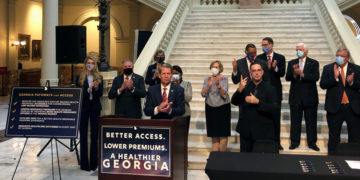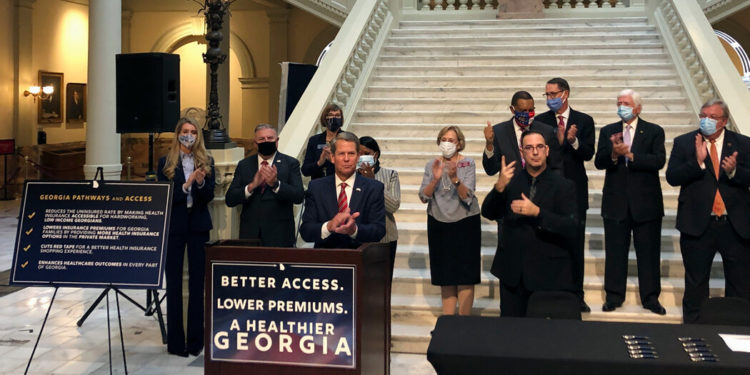The Affordable Care Act was once a potent electoral issue that could swing campaigns with its more familiar moniker, Obamacare. But the 2010 health law, a core piece of President Biden’s re-election campaign, did not factor into last week’s Republican National Convention.
The Republican National Committee’s platform made only vague reference to a Trump health plan, saying that the party will “increase transparency, promote choice and competition, and expand access to new affordable health care.” Former President Donald J. Trump, who said last year he was “seriously looking at alternatives” to Obamacare, made little reference to health policy in his speech on Thursday accepting the Republican nomination.
The fight over Obamacare has instead shifted more to state capitals, in part because a provision of the law allows states — which jointly finance Medicaid with the federal government — to expand their programs to cover more adults.
No state represents the continuing divisions over the Affordable Care Act’s place in the safety net more than Georgia, one of the last 10 holdouts that have refused to take up Medicaid expansion.
Last July, Georgia officials implemented a stricter alternative to Medicaid expansion, known as Georgia Pathways to Coverage. The new program required participants to show that they were working, enrolled in college or doing community service for at least 80 hours each month — activities that Republican state lawmakers said would encourage a spirit of accountability among recipients of publicly subsidized health benefits.
Officials estimated the program could enroll up to 100,000 residents within a year. As of the program’s one-year mark in early July, fewer than 4,500 Georgians had enrolled, according to state data.
To its critics, the Georgia experiment provides a cautionary tale in that campaign to reshape the management of Medicaid, which covers around 75 million people nationwide.
The costs of insuring recipients in Pathways dwarfs the costs of covering someone under regular Medicaid expansion, health policy experts have said. Operating the program has already cost the state and federal government more than $32 million, mostly for administrative expenses, according to state data.
“What’s clear is that the Pathways to Coverage program is more costly and covers fewer people than if we were to implement a program that fully covers the coverage gap,” said Leah Chan, a health policy expert who has tracked Pathways enrollment data at the Georgia Budget and Policy Institute, a nonprofit research firm.
Georgia already has one of the strictest income limits for Medicaid in the nation, and has carried one of the highest uninsured rates in the nation in recent years.
The push to install a work requirement has coincided with an enthusiastic embrace of the Affordable Care Act. Georgia has seen the third-fastest growth in enrollment of any state since 2020. More than 1 million people signed up for plans this year — a state record.
At the first presidential debate, held in Atlanta, Mr. Biden brought up the Affordable Care Act repeatedly, saying that 40 million Americans were benefiting from the program. That number appeared to account for people who signed up for plans on the federal and state marketplaces this year and have Medicaid coverage in states that expanded the program.
The federal government covers 90 percent of the cost of Medicaid expansion, and a 2021 pandemic relief package sweetened the deal further for states that have yet to expand. Those incentives have made the option attractive even to some fiscal conservatives.
The option has transformed the American safety net, allowing millions of adults to gain coverage. The results can come quickly. Half a million people in North Carolina have secured coverage after the state expanded the program last December.
Roughly 175,000 people in Georgia are stuck in the so-called coverage gap, earning too much to qualify for the state’s Medicaid program but not enough for heavily-subsidized plans on the Affordable Care Act’s marketplaces. More than 350,000 people in the state could be eligible for Medicaid if Georgia officials expanded the program, researchers have estimated.
The anemic enrollment in Pathways is the result of a number of factors, state lawmakers, advocates and policy experts said. Applying, enrolling and staying in the program can be confusing and bureaucratic. Many of those who have tried to enroll are still waiting for their applications to be processed.
After three months of inadequate hours or reporting, a recipient can be removed from Pathways altogether. But Georgia officials do not appear to be rigidly enforcing that policy. Fiona Roberts, a spokeswoman for the Department of Community Health, which oversees Medicaid in Georgia, said that no Pathways recipient had been terminated from the program.
State outreach to lower-income groups in the state has also appeared to be lacking.
Ms. Chan, the Georgia health policy expert, said that the state’s large uninsured population in rural areas of the state was not enrolling in great numbers in Pathways. “It’s not necessarily tracking to need,” she said of the program.
State officials were still marketing the program at events across the state and promoting Pathways on social media, television and radio, Ms. Roberts said.
Still, many lower-income residents of the state who would be eligible for Pathways would struggle to access the internet or deliver forms to a state health office, said Alysia Cutting, the rural health equity director of SOWEGA Rising, a nonprofit advocacy group in the southwestern part of the state. “You have the struggle with broadband making it hard for people to upload documents,” she said.
Finding people in rural Georgia who had enrolled was like “a needle in a haystack,” Ms. Cutting said.
Pathways, which was first approved in 2020, prompted a fierce legal battle between Gov. Brian Kemp, a Republican, and the Biden administration. The program was slated to launch in 2021 after securing approval from the Trump administration, but its start was delayed after the Biden administration withdrew that agreement. A federal judge in 2022 ruled that the program could go on, leaving Georgia as the lone state to operate a work requirement for Medicaid eligibility.
Garrison Douglas, a spokesman for Mr. Kemp, said that Georgia was “still fighting to reclaim the time stolen from us by the Biden administration.”
“The state is redoubling its efforts to educate and enroll as many eligible Georgians for coverage through Pathways as possible,” he said.
The presidential election could have enormous consequences for states eager to enact similar work mandates. The prospects of a Republican-controlled Congress undermining the Affordable Care Act is said to be one of the reasons that Representative Nancy Pelosi has expressed concern to Mr. Biden about his re-election chances.
If Mr. Trump wins another term, his health department may again encourage states to incorporate work requirements in Medicaid programs. During his time in office, 13 states were approved to implement them through so-called waivers, which allow states to test new strategies in Medicaid. The Biden administration has since withdrawn them.
“The ones who’ve been holding out for well over a decade, in the hopes that Obamacare was going to be found unconstitutional, or gutted by former President Trump, are now hoping that a second Trump administration will give them waivers for programs like Pathways,” said State Senator Jason Esteves, a Democrat who represents a suburban Atlanta district, referring to Republican state lawmakers.
Arkansas was the first state to enact work requirements for Medicaid, but its rocky implementation led to thousands of people losing coverage. The program was later struck down in court.
That has not stopped some other Republican-led states from trying again. Lawmakers in Mississippi, South Dakota and Idaho this year have considered legislation incorporating them. Laura Kelly, the Democratic governor of Kansas, included work requirements in a Medicaid expansion compromise bill that did not advance earlier this year.
Opponents of Medicaid expansion have long argued that the state’s financial share significantly strains already limited budgets and increases over time.
“They have developed this Georgia Pathways program to work within their resource constraints,” said Peter Nelson, a former Medicaid official in the Trump administration now at Center of the American Experiment, a think tank. “They’ve done something very different. But they’ve done something to get people covered.”
Chris Denson, the director of policy and research at the conservative Georgia Public Policy Foundation, said that “the promise of Georgia Pathways comes from providing a pathway for these enrollees to transition one day to private health insurance while receiving Medicaid coverage in the interim.”
Other state health policy experts have said that the program’s scant enrollment more than a year in is a sign of a deeper problem.
“I don’t know how long you can keep saying, ‘We need more time to see how it goes,’” said Laura Harker, a health policy analyst at the Center on Budget and Policy Priorities who has researched Pathways. “We’ve really just seen that it’s a lot of money to put into a program that’s not really putting funds into health care.”
The post Biden and Georgia Are Waging a Fight Over Medicaid and the Future of Obamacare appeared first on New York Times.



















